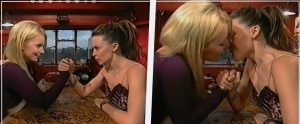Check out this blog, originally posted on Tumbler by @babe_tv about Girl Power in Babe Channels: The phenomenon of women appearing on television primarily to be ogled by men has for long been confined to the backwaters of specialist porn channels. Even ITV, with its proudly tacky history of serving up dumbed down populism, has, over the past quarter of a century, been reluctant to touch anything which is perceived to objectify women.
But whilst at face value the babe channels would appear to be the ultimate in objectification and a dead cert to upset feminists, in practice they haven’t generated anything like the kind of protest some might have expected. Ofcom’s findings on attitudes towards the babe channels have revealed very little public concern, and even the channels’ appearance in sensationalist news stories has basically been met with a unified public shrug.
The story in which it was revealed across the UK media (including on the BBC) that Babestation were loopholing Ofcom’s imposed watersheds with their non-UK broadcasting licences, received not only an incredibly tepid reaction from the public, but also a virtually indifferent response from the regulator itself. Ofcom had no choice but to justify itself publicly by approaching the Dutch regulator with a request for action once the story broke, but it was clearly only a case of an official body going through the motions, and if Ofcom had been in any way bothered, they wouldn’t have waited until BBC News was reporting on the matter before acting. The story quickly became a non-story, and died a death.
So was the kind of television to which feminist groups objected in the ‘60s, ‘70s and ‘80s more offensive to women than babe channels? Well, personally, I think it was much more offensive. Why? Because of who was seen to be in the driving seat, and because the babe channels are to a fair extent an inversion of the old tide of control. Despite how they’re sold, the visible face of the babeshows is not really about men controlling women. It’s about women controlling men, and the shows and their surrounding culture have been an extremely effective illustration of that. The fact that babeshow culture tends to wind up male chauvinists more than feminists tells a great deal about the bias of control.
The beauty contest heyday your Dad might fondly remember was all about hopeful babes being patronised and graded into order by men, and in most cases going away with nothing but a faint-praise damning and a nagging notion that they weren’t as good as the next girl. But the live babeshows are founded on girl power.
Perhaps the best public demonstration of how babeshow girl power operates to date came with the appearance of former Elite TV, (Now called Studio 66 or S66) legend Danica Thrall on Celebrity Big Brother (Channel 5 – 2012). Danica used a very typical brand of babeshow-esque girl power to establish control over not just men, but powerful, celebrity men who were clearly not used to being controlled in such a manner. It was the kind of stuff babeshow fans were used to seeing: a strong, assertive young woman taking men’s desires and using them to her own advantage.
But to see this working in real life and essentially turning powerful men into squabbling, lovestruck boys was a real measure of the modern day TV babe. This was no naïve hopeful standing meekly in line and awaiting judgement. It was a strong, independent woman calling the shots. Those men, and their emotions, were entirely at Danica’s mercy. Megababe Danica also heads this post, in a recollection from her Elite TV days – Freeview Channel 192, May 2011.
It would be stupid to say that the babe channels were responsible for the turn in the tide of control in situations of TV titillation, or that the tide has been completely reversed. But on the babe channels, the women are not perceived as amateur randoms subjecting themselves to male scrutiny and judgement on the off chance of being awarded some sort of value as objects. They’re professionals, they’re typically well paid, and it’s the male fans who fall into the role of hopefuls vying and bidding for their attention.
A lot of the groundwork for the (at least partial) transfer of control from the men to the women in TV titillation, came through the use of irony. Men were still able to ogle girls, but, at least officially, it was done in a tongue-in-cheek manner. A manner which acknowledged that objectification was wrong, but rather than getting angry about it, simply laughed at it, or embraced it in a way that would benefit the women.
Bobby Crush and the Bikini Babes
The link above will take you to a good example of this repositioning of bikini babes in TV culture. The original footage comes from the 1970s, and what would, at the time, have been taken seriously as a broadcast. A bloke with all his clothes on (Bobby Crush), playing a piano, among a sea of bikini clad women. He’s “the brains”. They’re “the scenery”. Typical ‘70s stereotyping, and not tucked away on some obscure satellite channel with a limited, adult audience. This would have been family viewing on BBC1.
One of my favourite relevant symbolic girl power moments is shown above, in a sequence from the end of the 1990s, in which Geri Halliwell and Kylie Minogue kissed on the weekend 18-30 culture show TFI Friday (Channel 4). The girls arm-wrestled in a specially filmed after-show aside, but rather than finishing the ‘match’ with a victory for either Geri or Kylie, they locked lips for an unexpected and memorable conclusion. The male reaction is nicely summed up by presenter Chris Evans.

Exactly how much symbolism was intended I don’t know. But for me, especially in retrospect, there are strong notes of girl power and its roots in female unity. The girls stop struggling to compete and instead unite, both gaining power in the process. But it’s also a perfect example of how the gravity centre of girls titillating men changed after televised beauty contests were ostracised in the ’80s. A lingering girl/girl kiss between two of the biggest music biz stars of 1999 was immensely sexy for the male audience, but it didn’t have any of the offensiveness of beauty contests, because there was never a sense that anyone other than Geri and Kylie were in control, and no one was being graded, pronounced inferior, or evaluated as an object. That was always where the offence lay in beauty contests – not in the levels of bare flesh.
It can’t be denied that the babeshows do objectify women, but that objectification comes more at the expense of men than the women, and it now has a sting in its tail for any random man who thinks he can take charge. He potentially can, for a very short, tightly controlled period, but it’ll cost him, and that’s the difference. I still think the babe channels need to be more clear in stressing that what happens within the confines of the services is unacceptable in other environments (because a lot of blokes obviously don’t get that). But the level of control the girls wield over the men makes the babeshows, in my view, much more publicly acceptable than beauty competitions. The babeshows do harness girl power, and whilst I wouldn’t expect an old-school feminist group to regard them with much affection, they’ve almost certainly taught male chauvinists many more lessons than a range of marches and rallies would have done.












